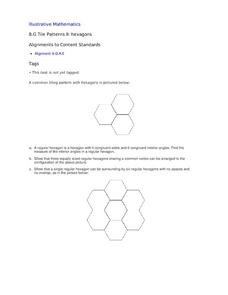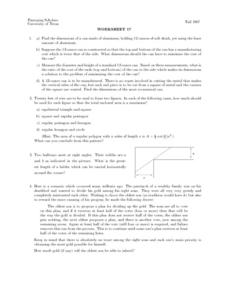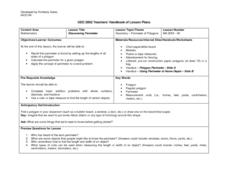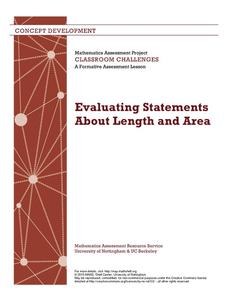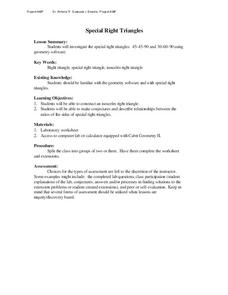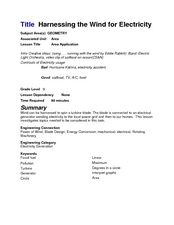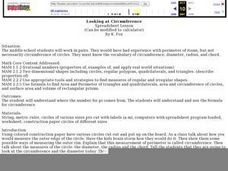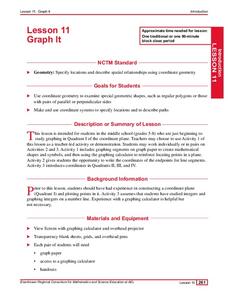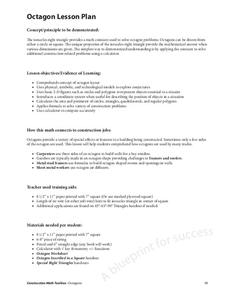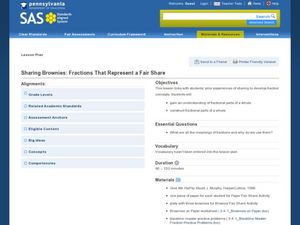EngageNY
Rotations, Reflections, and Symmetry
Lead your high school class on a journey through the world of symmetry and reflections as you discuss geometric principles. Pupils differentiate between reflections and rotations, explore rotational symmetry, and investigate how to...
Curated OER
Regular Polyhedra
Tenth graders investigate the history of geometry and its different shapes. In this geometry instructional activity, 10th graders practice seeing three dimensional shapes and explain why there are only five polyhedra. They relate all the...
Curated OER
Platonic Solids
Students identify different types of polygons. In this geometry lesson, students differentiate between convex and regular shapes. they identify the names of two and three-dimensional objects.
Curated OER
Tile Patterns II: Hexagons
After learning that the sum of interior angles for triangles is 108 degrees, take it further to show that the sum of angles in any polygon is the same! Using hexagons, pupils practice finding the measure of the six congruent angles. Make...
Mascil Project
Circular Pave-Stones Backyard
Pack the lesson into your plans. Young mathematicians learn about packing and optimization with the context of circular paving stones. They use coins to model the paving stones, and then apply knowledge of circles and polygons to...
Curated OER
Worksheet 17 - Area
In this area worksheet students read story problems, determine the necessary information to solve the problem. They find the amount of material needed to construct three-dimensional figures. Students determine the greatest and least area...
Curated OER
Discovering Perimeter
Twelfth graders apply perimeter measurement to items found in newspapers and calculate the cost in terms of feet or yards. They share answers and explanations with classmates.
Curated OER
Math: Shapes and More Shapes
Students locate lines of symmetry in regular polygons and predict the number of lines of symmetry in an octagon. In three different polygons, they construct all lines of symmetry and after making their prediction about the octagon,...
Curated OER
Exploring and Creating Tessellations
Students use translations, rotations, and reflections to create tessellations. They explore and construct several different types of tessellations including pure/semi-pure and non-regular polygon and "Escher-like" tessellations .
Curated OER
Traditional American Indian Lodges
Young scholars explore the mathematical properties of traditional American Indian lodges. They examine the effect of increasing sides of a polygon, calculate the surface area of prisms and cylinders, and construct a classroom size...
Mathematics Assessment Project
Evaluating Statements About Length and Area
Class members complete an assessment task by identifying whether statements about triangles and quadrilaterals are always true, sometimes true, or never true. They then participate in a sorting activity with the same objective.
Curated OER
Tessellations
Students create tessellations. In this geometry lesson, students use polygons to create different patterns by rotation. They identify the reasons for polygons to create the type of tessellation it does.
Curated OER
Tessellations
Learners identify shapes that will tessellate. They construct a tessellation using transformations. Students identify transformations in tessellations. They identify applications of transformations such as tiling and fabric design.
Curated OER
Special Right Triangles
Students identify different types of special right triangles. In this geometry lesson, students differentiate between right triangles and isosceles triangles. they construct the triangles using geometry software and make conjectures...
Curated OER
Geometry Scavenger Hunt
Students hunt for hidden geometric shapes and compare the properties of various shapes. In this geometry lesson, students play a game of finding squares, circles, rectangles, and ovals that have been hidden around the classroom. Students...
Curated OER
Barrels, Casks and other Curvy Containers: Math, Geomety, Art
Middle schoolers construct a barrel or other curvy container and then estimate and gauge its volume.
Curated OER
Harnessing the Wind for Electricity
Ninth graders explain how wind can produce electricity. In this geometry instructional activity, 9th graders construct their own pin wheel turbine and calculate its power. They discuss the pros and cons of using wind generator.
Curated OER
Seeing is Believing - Or Is It?
Here is a great science instructional activity. It extends the concept of vision into the area of optical illusions, perspective, and tessellation. This well-designed plan has tons of great activities, utilizes interesting video, and...
Curated OER
Sphere Dressing
Geometric design makes a fashion statement! Challenge learners to design a hat to fit a Styrofoam model. Specifications are clear and pupils use concepts related to three-dimensional objects including volume of irregular shapes and...
Curated OER
Looking at Circumference
Young scholars understand where the number for pi comes from. They understand and use the formula for circumference. Students measure the circles given out and the diameters of those circles and record the results on their worksheet.
EngageNY
How Do Dilations Map Angles?
The key to understanding is making connections. Scholars explore angle dilations using properties of parallel lines. At completion, pupils prove that angles of a dilation preserve their original measure.
Curated OER
Graph It
Elementary and middle schoolers engage in a lesson of graphing in quadrant I of the coordinate plain. They use the graph to create shapes and symbols. While using a graphing calculator, they locate the points on the coordinate plane. In...
Curated OER
Octagon Lesson Plan
Students investigate octagons using words and shapes. In this geometry lesson plan, students discuss the shape of an octagon using physical and symbolic models. They make conjecture about the shape and relate it to the real world.
Curated OER
Sharing Brownies: Fractions That Represent a Fair Share
Elementary graders discover the concept of fractional pieces of a whole. They investigate the meanings of fractions in everyday life and why they are used. Pupils divide brownies amongst each other to demonstrate the use of fractions...



